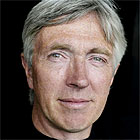All publishing houses have archives, but for anyone interested in 20th-century literature the archive of Faber & Faber is a fabled treasure house. This is the firm that was, as Toby Faber puts it, “midwife at the birth of modernism”. In 1924 Faber’s grandfather, Geoffrey Faber, aspiring poet and fellow of All Souls College, Oxford, had been installed as chairman of the Scientific Press, recently inherited by another All Souls fellow, Maurice Gwyer. It published mostly books and journals for nurses. Geoffrey Faber renamed it and started making it into a literary publisher. Within his first year he had installed TS Eliot as a fellow director and acquired his backlist.
The firm would go on to publish Ezra Pound, WH Auden and James Joyce’s Finnegans Wake. Then Robert Lowell, Sylvia Plath, Ted Hughes, Philip Larkin, Seamus Heaney: a poetry list to beat all others. Academics have always itched to get into the Faber archive, to get at the letters and memos that record how this 20th-century canon was made. Toby Faber has rights of entry. He has given us a highly selective anthology rather than a narrative: his book is made up of extracts from original documents (mostly letters, but also memos, board minutes and blurbs), with spare comments from himself.
Above all, his book illustrates the firm’s commercial precariousness. In the early years, Faber’s accountant sternly counselled Geoffrey Faber to dump the literary stuff and concentrate on the firm’s only worthwhile commodity, the Nursing Mirror. He was both contradicted and vindicated in 1929 when this periodical was sold for £190,000 – a huge sum at the time – ensuring the survival of the publishing house for the following decade or two. In his struggles to ensure his firm’s survival, Faber emerges as a rather heroic figure, by turns pooterish and visionary. His letters are disarmingly candid. He confesses to Marie Stopes (in the process of declining to publish her book of poems, Love Songs for Young Lovers) that he himself has been a would-be poet, whose inspiration has withered, but that publishing modern poetry “has in some queer way satisfied my own frustrated ambition”. Eventually, in 1941, Faber did publish his collected poems; they have not come down to posterity. He did make good picks, relying on Eliot’s impressive taste.
When the firm announced its first three collections by new poets in 1930, one was Auden’s Poems. Eliot spotted the talents of Marianne Moore and Louis MacNeice (even though the latter had sent his poems without any covering letter or return address). The cover blurb for MacNeice’s poems epitomises the firm’s austere manner of praise: “dour without sentimentality … his work is intelligible but unpopular”. Eliot plumped for Samuel Beckett. When he was shown Hughes’s unpublished The Hawk in the Rain, he simply scrawled: “I am inclined to think that we should take this man now.”
There were also mistakes. From fear of prosecution, Faber & Faber hesitated about Ulysses, allowing the Bodley Head to get it; “Feebler and Fumbler”, Joyce called the firm. Eliot turned down both George Orwell’s Down and Out in Paris and London and, later, Animal Farm. He thought the latter a “distinguished piece of writing” but worried (in 1944) whether it was “the right point of view from which to criticise the political situation at the present time”. Profitable opportunities were lost. Several letters chart the falling out with CP Snow, who was convinced that Faber was not striving sufficiently to sell his books and who patrolled London bookshops in the weeks before Christmas to see if they were stocking copies. He had the temerity to acquire an agent, who duly pressured the firm even more. Snow left, and duly produced a series of bestsellers.
The blend of old-school gentility and literary adventure is epitomised by Faber director Charles Monteith. As a young fellow of All Souls (another one), he wrote out of the blue to Geoffrey Faber saying that he fancied working “in a ‘booky’ atmosphere”. A year later, he was in. Monteith became a fabled talent spotter, recovering Lord of the Flies from the slush pile. Toby Faber reproduces the letter from William Golding, a Salisbury school teacher, over which a Faber reader had written: “Rubbish & dull. Pointless. Reject”. It is Monteith who reads three poems by Heaney in the New Statesman and duly hooks him for his first collection, published in 1966. Ditto Paul Muldoon, six years later.
The funniest document in the collection is a letter from Monteith to an official at the Travellers’ Club, apologising for the unconventional garb of the poet Thom Gunn, whom he had invited to luncheon. “Since he was educated at Bedales and at Trinity College, Cambridge, I took it for granted that he would be aware of the ordinary social conventions in matters such as this.” But Gunn had been living in San Francisco and appeared in fringed leather jacket and cowboy boots.
Financial calculation continued to vie with literary high-mindedness in later years. In 1981 an employee wrote a note to chairman Matthew Evans complaining about the decision to publish a Not the Nine o’Clock News spinoff annual. The firm existed “to produce books which can be considered important”. (This unacceptably frivolous publication earned the firm more than £250,000 in profits.) Extracts from board minutes show that only royalties from Cats and the Spitting Image book kept the firm going in the 1980s. Andrew Lloyd Webber may or may not have enriched the musical stage, but he has done a great service to literary publishing.
• Faber & Faber: the Untold Story by Toby Faber (RRP £20). To order a copy go to guardianbookshop.com or call 0330 333 6846. Free UK p&p over £10, online orders only. Phone orders min p&p of £1.99.










